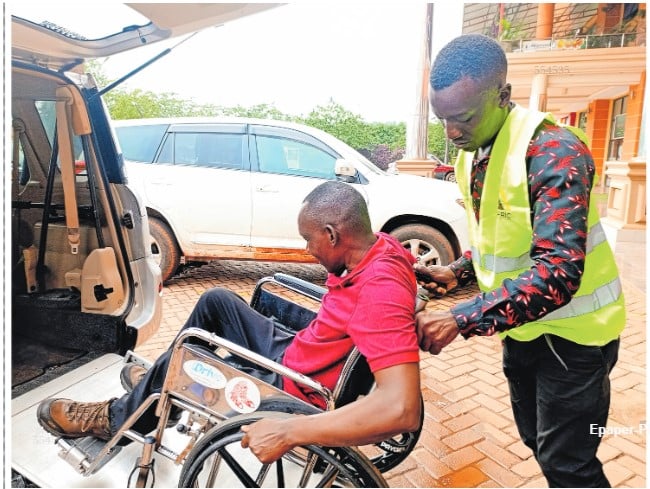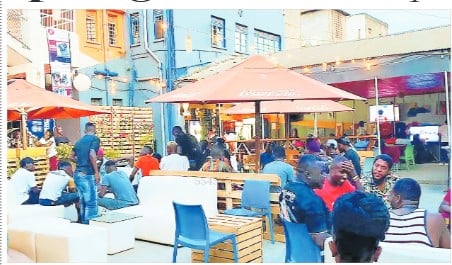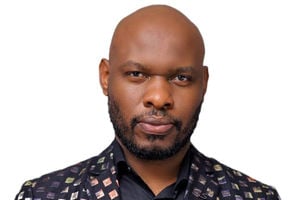Prime
Mother seeks justice for son killed in rehab at Butabika

Mark Leslie Mudoola (right) and his mother Annet Nabwire. PHOTO/COURTESY
What you need to know:
- Mark Mudoola, a S6 leaver, arrived at Butabika hospital seeking rehab but within hours, a head injury sustained from a blunt object had sent him into a coma, and three days later, he was dead.
Mark Mudoola arrived at the Luzira-based Butabika National Referral Mental Hospital on the morning of Monday, May 17, to start rehabilitation.
He was accompanied by his mother, Annet Nabwire, and elder sister Ritah Sanyu. But three days later, a restless Nabwire returned to check on Mudoola, only to find death had long stiffened the body of her only son.
“I believe my son died on Wednesday [May 19] but no one at the hospital called to say so,” Nabwire told Saturday Monitor recently.
“I only received a call from a woman while alighting from a taxi in Luzira while visiting the hospital.”
A May 21 post-mortem report from the city mortuary signed by police pathologist Dr Richard Ambayo states that the 19-year-old Senior Six (S6) leaver from St Mary’s College Kitende, died from a “head injury following a blunt force trauma.”
But Butabika is just a mental hospital and, professionally, is not expected to be found treating such critical head injuries that can cause internal bleeding to the brain, fracture of the skull, or even excessive blood loss, all critical cases that demand urgent medical attention that a psychiatric facility cannot offer.
Health ministry spokesperson Emmanuel Ainebyoona could not readily confirm whether Butabika’s medical scope extends to treatment of patients with head injuries, which poses a question whether Mudoola’s life could have been saved had doctors at the psychiatric facility sought immediate treatment for his injuries from better qualified facilities before returning him to continue with the rehab.
Background
Mark Leslie Mudoola was born on January 3, 2002, to Fredrick Muwumba and Annet Nabwire. The only boy and last born of three siblings went to Iganga Boys for primary education, then joined Kisubi for three years before completing his O-Level education at Green Hill Academy in Kampala.
In 2019, Mudoola joined St Mary’s College, Kitende, and that is where the family suspects something started going wrong.
“Mark was a very happy and calm boy but he changed out of the blue,” Sanyu says. “He became a loner, quiet but if compelled to talk, he would be rude so we decided to take him to Butabika hospital to establish the cause of his new behaviour.”
When Mudoola joined Kitende, he spent his holidays in Bunga in Kampala with his paternal uncle and only visited the mother in Jinja once in a while. One of those visits coincided with the lockdown in March last year and the then candidate student was held up in Jinja.
This gave the mother enough time to observe his behaviour and the first attempt was to seek psychiatric examination in Jinja.
“He was given some medicine that seemed to help him, but after he went back to school when they reopened for the candidates, he stopped the medication and suffered a relapse,” the mother, who admitted Mudoola could have been exposed to drug and substance abuse, says.
“Most of his friends were children of big shots and these kids had all the money they needed so they did as they wished,” she says regretfully.
The fatal fight
Mudoola had willingly gone for psychiatric examination at a medical facility in Jinja City during last year’s nationwide lockdown that shut schools and delayed national exams. At the time, Mudoola did not have to be tied and dragged to the mental hospital.
But trouble started when Mudoola was admitted to the Kirinya Court ward at Butabika hospital. He rejected the ward, citing the patients in there as ‘mad’ yet he believed he was not as mentally sick as they were. The askaris [guards] could have none of his reservations and demanded he changes into the in-patients uniform.
“He [Mudoola] fought off the guards who were forcibly undressing him and in the scuffle, he pushed one of them to the ground,” Nabwire narrates.
“One of the guards, who was watching the scuffle from a distance, did not like it. He jumped in with a baton and struck my son three times on the head.”
The baton alone could have caused a serious head injury given the “brute force” applied, but fate was not on Mudoola’s side. He hit his head on the edge of a metallic seat and went cold.
Sanyu says she ran to his brother’s rescue when he saw him collapse with blood gushing from his head but she was shielded away by medical officers at the facility. “They said that was the ‘first treatment’ administered to stubborn patients,” she says.
Mother and daughter were then sent back home after being assured that Mudoola would be fine after some treatment.
Sanyu says her pleas for a scan to be done to ascertain the extent of the head injury were rejected.
“Apparently, it is their policy not to release any medical forms to patients or their guardians or so I am told. We asked for Mark’s documents but they said it is in the file,” Nabwire says.
Earlier, the two had been asked to buy a drug whose name Nabwire says she cannot recall. They had been told the drug was not available in Butabika, but at a drug shop in Bugolobi, another city suburb.
But it turned out to be beyond their means.

Senior Six leaver Mark Leslie Mudoola died three days after he was admitted to Butabika hospital on May 17, to start rehabilitation. PHOTO/COURTESY
Lack of concern
A nurse approached Nabwire, saying she had the drug at a discounted Shs170,000.
“I told her I did not have that much and she scribbled her MTN and Airtel mobile numbers, asking we send the money for the drug on either of the numbers,” Nabwire says.
The two identical mobile numbers, separated by the telecom codes, are registered in the name of a one Deborah.
“The nurse called on Tuesday morning and without even telling me how my son had spent the night, started asking for money. Disappointed, I called another medical officer, who advised against giving Deborah any money,” she says.
On Wednesday, nurse Deborah called again, this time from Jinja, and asked Nabwire to meet her at Jinja School of Nursing with partial payment for the drug. But when Nabwire demanded to know her son’s condition, the nurse had no update.
“Here was a nurse coming from Butabika, who did not know the condition of my son, but was asking for money, saying I give her even only Shs100,000. I told her I was in Iganga,” she said.
Suspicious, Nabwire then contacted a matron and a staff at Butabika only identified as Justine.
Both were surprised that the patient’s guardians were asked to buy a drug that was in stock.
When contacted for a comment, nurse Deborah denied asking for money for medicine from Nabwire, but told Saturday Monitor she was not comfortable discussing the matter on phone and suggested we meet her in person.
Feeling restless on Wednesday evening, three days after her son was admitted to Butabika, Nabwire decided to return to Butabika on Thursday, May 19. She informed Deborah who had again earlier called to ask for the money.
“She was taken aback by my change of plan because I had told them I would go there on Friday. Now I was there a day earlier.”
A chilling phone call greeted Nabwire on arrival at Luzira. The caller, Sr Florence Nanyonga, asked if Nabwire had received any call from Butabika the previous day, asking her to check on her son Mudoola.
She had not, but it was easy to draw a conclusion. Nurse Deborah had most probably alerted Butabika that the mother of Mudoola, whose body they were discussing how to deal with, had changed her plans.
“A nurse took me aside where I had found several doctors in a tense debate and told me to be strong,” she says.
“After crying for 30 minutes, I demanded to know what had killed my son and the nurse started dissuading me from going for a post-mortem. She told me of how the procedure will only leave me with only body parts as internal organs would be removed.”

The May 21 post-mortem report from the city mortuary signed by police pathologist Dr Richard Ambayo stating that Mudoola “died from a “head injury following a blunt force trauma.”
‘I want justice for my son’
Exactly a month to the day Mudoola tragically breathed his last from Butabika, Nabwire was finally ready to speak to the media. But not ready enough. Time heals but a month is not enough time. She would break down time and again while narrating events of the fateful day to Saturday Monitor.
“My son was killed and someone should be answering for that,” the businesswoman from Jinja says.
“These people were not professional at all.”
Nabwire suspects, and probably rightly so when the post-mortem report is considered, that Mudoola had lost consciousness after taking the hits from the baton and with the fatal fall, gone into a coma after possibly fracturing his skull.
“We had no chance at all to speak with him as the medics blocked us from getting close to him,” she says. “These are doctors and they surely must have known the severity of the injury, so to have kept him with them instead of rushing him for urgent medical attention at facilities better suited to handle such a case is nothing but murder.”
Nabwire says the hospital’s decision to refuse to keep her abreast with Mudoola’s condition could have been “intentional because these people look like they could have covered up the death of my son by burying him secretly and then claim that he had escaped from the hospital.”
While it is easy to dismiss her suspicions given she is still in grief, in a world that is increasingly twisted by greed and inconsiderate human behaviour, one can bet on as much.
The aggrieved mother argues the hospital was forced to announce the death of Mudoola because it would be difficult to cover up since the mother and sister had both witnessed the scuffle and the fatal injury the deceased had sustained.
A criminal case under file number SD 09/20/05/2021 has been opened at Butabika Police Post. Nabwire says she will fight for her son to get justice and intends to pick up the detailed post-mortem report and use it to pin Butabika for “lack of professionalism” and manslaughter.
Butabika Hospital’s response
Dr Juliet Nakku, the executive director of Butabika hospital, said she was investigating the matter.
“Interestingly, two very senior doctors attended to this patient right from OPD [outpatient department],” Dr Nakku said in a message sent through Health ministry spokesperson Emmanuel Ainebyoona.
“The deceased was intoxicated on drugs and extremely violent. He attacked and seriously injured one of our security men. He fell as efforts were made to restrain him so he doesn’t end up killing staff in the ward. He was eventually restrained and given treatment. He died days later in the ward, which was unfortunate.”

Butabika Hospital executive director, Dr Juliet Nakku. PHOTO/FILE
But the family maintains Mudoola walked into Butabika well knowing where he was going and the reason for the same.
“Mark was not violent because we took him to Butabika while he was walking on his own, not until the doctors told him he was to be admitted, and ordered him to undress and put on their uniform,” Mudoola’s sister Sanyu says.
Big question
Is there a ground for suing a school if you took your child over and they got addicted to drugs?
Traditionally, schools are to educate and instill values, but when they fail in the latter, can a parent sue and make them accountable if the consequences of the drug abuse resulted in the death of a child? Eron Kiiza (Human rights lawyer)
Generally, that would be legally feasible in a foreign country with a mature Judiciary. We do not have that privilege in Uganda. Even in mature democracies, the standard for such suits is high and requires strictly proving a direct connection between the child’s death and school negligence driven by drug addiction. A good start is a comprehensive, clandestine and thorough investigation story after schools reopen. Once it is prominently aired, more parents and old students may shed their fear and come out and confess, creating the mood for accountability. Anonymous (lawyer)

The parent will have to prove that it was a school policy to give students drugs or that the school condoned the practice. At best, you will have to prove negligent actions by the school that facilitated the practice. I know the duty of care that schools have but also imagine the fact that out of 1,000 students, it may be only 50 who abuse drugs. This shows the school has done well. But it is a good area to explore further.





